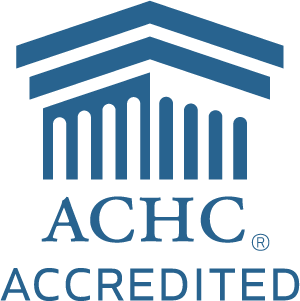Several factors can cause older adults to be susceptible to allergic reactions when exposed to elements such as mold, pollen, dust mites, pollution, and many other substances, whether irritants or not. While a senior may not have had allergies during their younger years, a weakened immune system, other health conditions, medications, a more sedentary lifestyle, dietary factors, and more pollution or exposure to irritants can contribute to the presence and exacerbation of allergy symptoms in the elderly.
Some indications of seasonal allergies in seniors include:
- Sneezing
- Coughing
- Congestion
- Runny nose
- Wheezing
- Itchy, watery eyes
- Itchy ear canals
- Sleep disturbances
- Lethargy
- Aches and pains
- Hives
- Breathing difficulties
Home healthcare providers and family members should be aware that seniors can develop seasonal allergies, what signs to look for, and how to prevent more serious conditions from occurring.
 As we age, due to a process known as Immunosenescence, our immune systems become weaker, making it more difficult to fight off pathogens, for wounds to heal, and for our bodies to respond to foreign substances. Other bodily changes, such as dry eyes and degradation of other mucous membranes, can also cause seniors to have a lower tolerance to irritants such as pollen and environmental pollutants. Wearing sunglasses when outside and washing hands after being outdoors can help to prevent irritants from irritating the eyes and skin.
As we age, due to a process known as Immunosenescence, our immune systems become weaker, making it more difficult to fight off pathogens, for wounds to heal, and for our bodies to respond to foreign substances. Other bodily changes, such as dry eyes and degradation of other mucous membranes, can also cause seniors to have a lower tolerance to irritants such as pollen and environmental pollutants. Wearing sunglasses when outside and washing hands after being outdoors can help to prevent irritants from irritating the eyes and skin.
Changes in activity level that many seniors experience can also increase their susceptibility to seasonal allergies. Caregivers need to maintain cleaning and laundry routines to prevent the buildup of potential allergens and observe local pollen counts to avoid exposure at peak times. Using air purifiers, changing furnace filters, changing bedding frequently, dusting and vacuuming are all vital to maintaining healthy indoor environmental conditions for seniors. Family caregivers can work together with home healthcare professionals to make sure cleaning routines are scheduled to prevent seasonal allergy symptoms. Overall, reducing seniors’ exposure to both environmental and chemical irritants can reduce their susceptibility to seasonal allergies.
Many older adults are living with other chronic health conditions, like respiratory or cardiovascular disease, eczema, and dementia, and are also taking medications to manage those symptoms. These diagnoses, and others, can exacerbate mild seasonal allergies in seniors and left unmanaged, can lead to more serious medical complications including an increased risk of stroke.
Older adults are advised against taking 1st generation antihistamines, as they can cause blood pressure or other serious health conditions in this age group. While 2nd and 3rd generation antihistamines are considered safer options, as well as other allergy medications including nasal steroid sprays, caregivers must choose both safe and realistic medication options to manage allergy symptoms depending on the cognitive level and severity of the condition. Drug interactions must also be considered, making it more complex to treat seasonal allergies in the elderly. It is extremely important to consult with your physician before taking any over-the-counter allergy medications.
Seasonal allergies can be difficult for caregivers to detect in home care settings due to the various factors that contribute to the development of symptoms in older adults. However, prompt treatment can help prevent more serious escalations of other conditions or developments of new ones. Caregivers providing homecare, whether family members, therapists, or medical professionals, should be aware of the tendency for seniors to develop seasonal allergies and how to prevent and manage symptoms, should they arise.
Allcare Home Health Agency, Inc. provides in-home assistance for seniors in the Raleigh/Durham area. Call (919) 301-0236 today for your home health care needs.
References:
Can You Develop Allergies Later in Life? – Cleveland Clinic
How to Help a Senior Safely Manage Allergy Season – AgingCare.com
Seniors & Allergies: How seasonal allergies affect adults 65+

